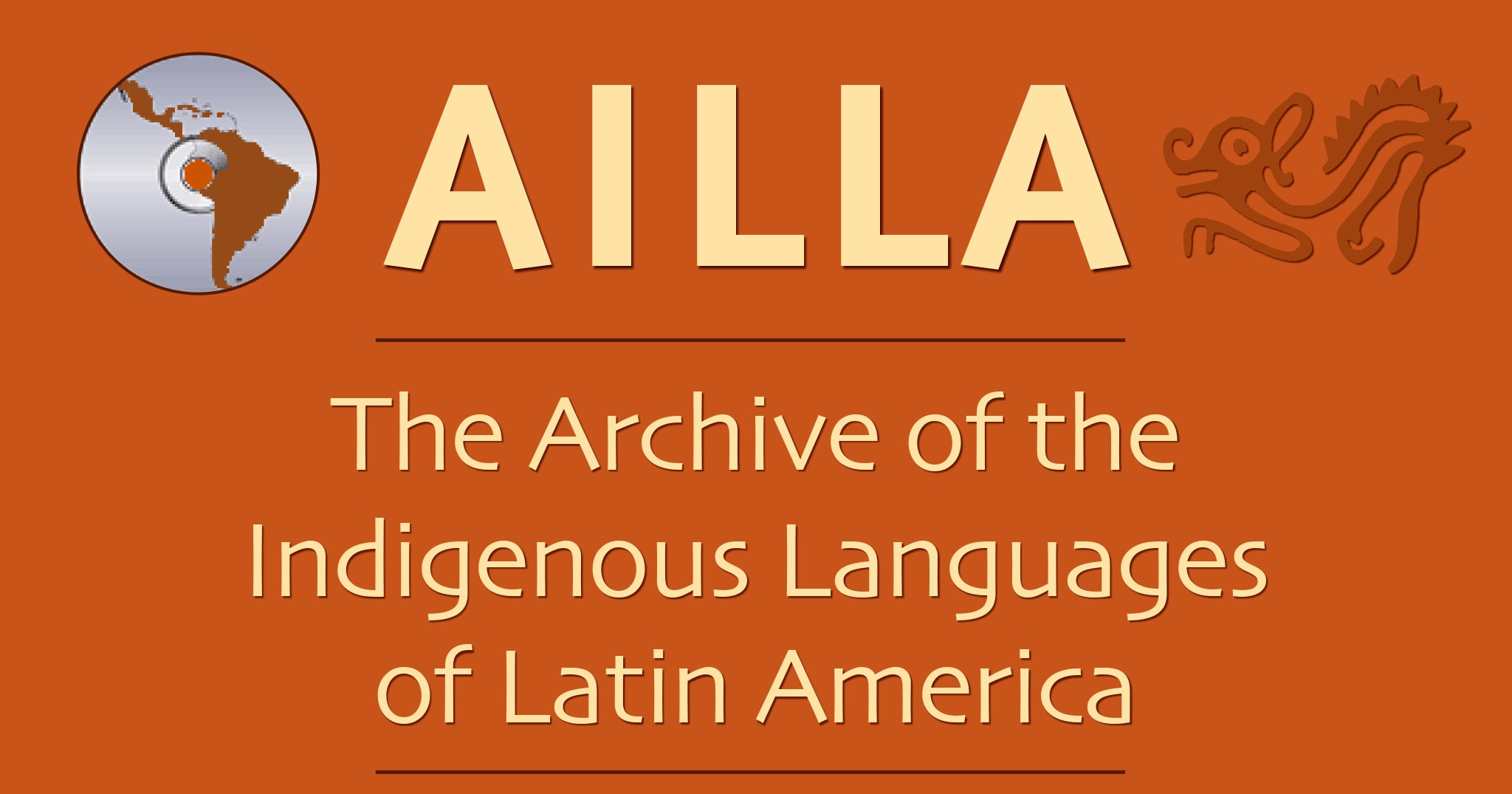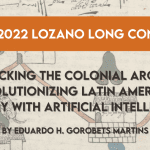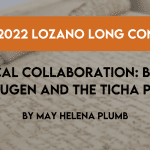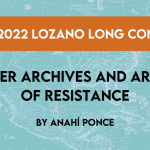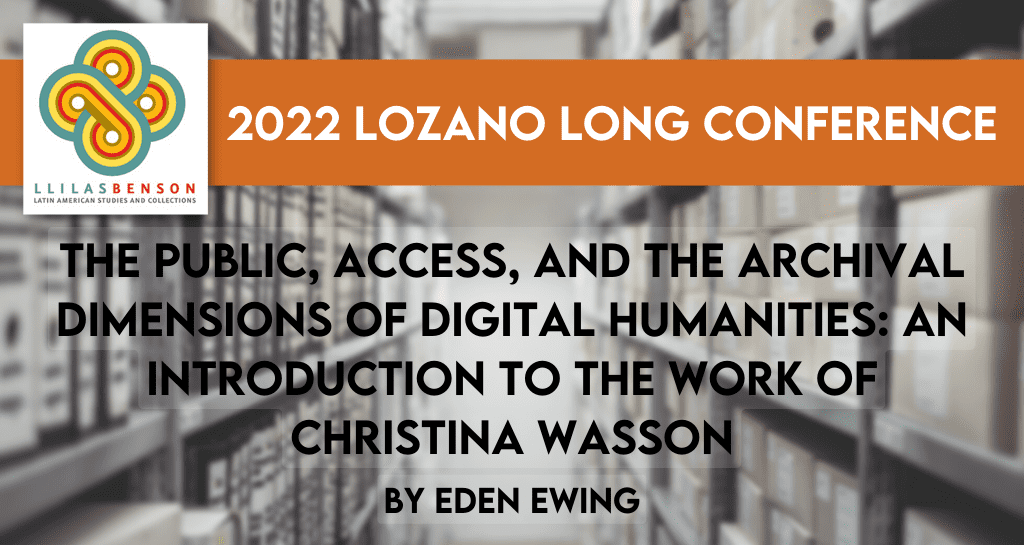
by Eden Ewing
In honor of the centennial of the Nettie Lee Benson Latin American Collection, the 2022 Lozano Long Conference focuses on archives with Latin American perspectives in order to better visualize the ethical and political implications of archival practices globally. The conference was held in February 2022 and the videos of all the presentation will be available soon. Thinking archivally in a time of COVID-19 has also given us an unexpected opportunity to re-imagine the international academic conference. This Not Even Past publication joins those by other graduate students at the University of Texas at Austin. The series as a whole is designed to engage with the work of individual speakers as well as to present valuable resources that will supplement the conference’s recorded presentations. This new conference model, which will make online resources freely and permanently available, seeks to reach audiences beyond conference attendees in the hopes of decolonizing and democratizing access to the production of knowledge. The conference recordings and connected articles can be found here.
En el marco del homenaje al centenario de la Nettie Lee Benson Latin American Collection, la Conferencia Lozano Long 2022 propició un espacio de reflexión sobre archivos latinoamericanos desde un pensamiento latinoamericano con el propósito de entender y conocer las contribuciones de la región a las prácticas archivísticas globales, así como las responsabilidades éticas y políticas que esto implica. Pensar en términos de archivística en tiempos de COVID-19 también nos brindó la imprevista oportunidad de re-imaginar la forma en la que se llevan a cabo conferencias académicas internacionales. Como parte de esta propuesta, esta publicación de Not Even Past se junta a las otras de la serie escritas por estudiantes de posgrado en la Universidad de Texas en Austin. En ellas los estudiantes resaltan el trabajo de las y los panelistas invitados a la conferencia con el objetivo de socializar el material y así descolonizar y democratizar el acceso a la producción de conocimiento. La conferencia tuvo lugar en febrero de 2022 pero todas las presentaciones, así como las grabaciones de los paneles están archivados en YouTube de forma permanente y pronto estarán disponibles las traducciones al inglés y español respectivamente. Las grabaciones de la conferencia y los artículos relacionados se pueden encontrar aquí.
Online language and cultural heritage archives are key resources for language revitalization and the preservation of traditional cultural practices. It is, however, unfortunate that these archives are often inaccessible not only to researchers, but also to the communities whose languages and traditional cultural practices they draw from. Dr. Christina Wasson works to bridge this gap and to encourage archivists, researchers, and other key stakeholders to prioritize accessibility and Indigenous user groups in archival design.
Wasson has been working since 2016, beginning with the Workshop on User Centered Design of Language Archives at the University of North Texas, to bring the field of language archives and user-centered design into conversation with one another and to promote the accessibility of language archives for both academic and Indigenous user groups. Through her work, she aims to brings an awareness of colonialism’s role in the loss of language and traditional cultural practices in Indigenous communities. Such work adopts a decolonizing approach to the development of language and cultural heritage archives. Furthermore, Wasson emphasizes the need for Indigenous data sovereignty and the importance of Indigenous research methods.
Wasson received her B.A. in Linguistics and Anthropology from the University of California at Berkeley and a Ph.D. in Anthropology from Yale University. She’s been teaching in the Applied Anthropology program at UNT for the last 20 years. In fact, Dr. Wasson was my thesis chair and advisor during my time in the Master’s in Applied Anthropology program at the University of North Texas. She was an amazing resource and mentored me as I worked with the Archive of the Indigenous Languages of Latin America (AILLA) at the University of Texas at Austin for my thesis project and engaged in research on user-centered design applied to the field of language and culture archives. For my project, I conducted a user-research study of AILLA with the goal of having my research used to improve AILLA’s accessibility to different user groups. Our research interests overlap, so she was a natural fit as chair of my committee. She is both an insightful researcher and an exemplary teacher.
As an applied anthropologist, Dr. Wasson’s work is remarkably interdisciplinary. In addition, she also has experience outside of the academic field. Before she came to UNT, she worked with the design firm E-Lab LLC in Chicago as a project manager, bringing her experience as an anthropologist to the world of applied ethnography and user experience research. She managed groups of researchers and designers to execute projects and helped design new collaborative research methodologies.
She has published more than forty articles, five of which are in the field of user-centered design and language and cultural heritage archives. Her first publication on user-centered design and language archives, written in collaboration with Heather Roth at the University of North Texas and Dr. Gary Holton at the University of Hawai‘i at Mānoa, Findings from the Workshop on User-Centered Design of Language Archives: White Paper, was published in 2016 and describes findings from a workshop that was organized by Wasson at the University of North Texas in 2016. This workshop engaged key stakeholders in conversations centering the diverse perspectives of different user groups, the different types of language archives, and issues surrounding archival accessibility. The second publication, also a collaboration with Holton and Roth, entitled “Bringing User-Centered Design to the Field of Language Archives,” offers a compelling argument for a user-centered approach to archival design and how developers can use design to identify the main user groups of their archive.
In 2017, Wasson’s article “Conducting User Research to Inform the Design of Language Archives” was published on the Linguistic Society’s website, detailing the need for language archives to conduct research with intended user groups to meet the needs of users. Wasson identifies five user groups, language communities, linguists, archivists, user-centered design practitioners, and funding agencies, as key stakeholders. The article also briefly describes the results of an exploratory user research project conducted by her fall 2016 design anthropology class for what would become CoRSAL (the Computational Resource for South Asian Languages at the University of North Texas). Like other online language and cultural heritage archives, CoRSAL hosts audio, video, and text files such as dictionaries, wordlists, grammars, ethnographies, and other materials on minority languages in South Asia. “Creating Online Resources for Language Documentation” offers a brief overview of the insights she has uncovered through several years of research and what Indigenous users may need regarding the accessibility of language archives.
Dr. Wasson has been working with two Indigenous communities in Northeast India for the last five years on a participatory design project for a language and culture archive. It uses the Mukurtu CMS platform, a content management system that prioritizes Indigenous communities. You can visit the archive here http://bododimasaarchive.org. In Wasson’s most recent publication, “Participatory Design of Language and Culture Archives,” she shares insights derived from her work with the Bodo and Dimasa communities in India. The archive demonstrates what a user-centered design approach can accomplish when applied to language and cultural heritage archives.
Dr. Christina Wasson was a contributor to the 2022 Lozano Long Conference, which was held in honor of the centennial of the Nettie Lee Benson Latin American Collection. Titled “Archiving Objects of Knowledge with Latin American Perspectives,” this conference initiated a conversation on archives as both repositories of knowledge and as sites of power. It is my hope that this overview will give attendees an understanding of the work Wasson engages in and encourage them to become acquainted with her research.
The views and opinions expressed in this article or video are those of the individual author(s) or presenter(s) and do not necessarily reflect the policy or views of the editors at Not Even Past, the UT Department of History, the University of Texas at Austin, or the UT System Board of Regents. Not Even Past is an online public history magazine rather than a peer-reviewed academic journal. While we make efforts to ensure that factual information in articles was obtained from reliable sources, Not Even Past is not responsible for any errors or omissions.
